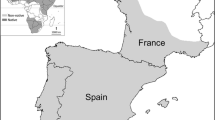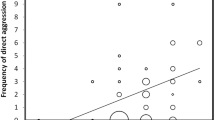Abstract
Pup survival and growth rates were monitored to determine whether paternal care potentially contributes to reproductive success of male common voles Microtus arvalis Pallas, 1779. The subjects were 258 pups from 47 litters obtained from adult voles trapped in the wild. Reproducing pairs were formed and divided onto two groups in accordance with the age and parental experience of the reproducing individuals: group I included pairs with subadult males and nulliparous females; group II included pairs with adult males and multiparous females. Each of the groups was divided into two subgroups: in subgroups Iа (n = 13) and IIа (n= 11), litters were raised by females without sires; in subgroups Ib (n = 12) and IIb (n = 11), litters were raised by both parents. The litter size was recorded at parturition and again when the young were 12, 21, and 30 days old. Pups in each litter were weighed at parturition and also again when the young were 12, 21, and 30 days old. This study has shown that the presence of the sire may negatively affect both survival and growth rates of the pups, but this effect is dependent on the age of the reproducing individuals.
Similar content being viewed by others
References
Ahroon, J.K. and Fidura, F.G., The influence of the male on maternal behaviour in the Mongolian gerbil (Meriones unguiculatus), Anim. Behav., 1976, vol. 24, pp. 372–375.
Barnett, S.A. and Dickson, R.G., A paternal influence on survival of wild mice in the nest, Nature (Lond.), 1985, vol. 317, pp. 617–618.
Bashenina, N.V. and Meier, M.N., Postnatal period. Growth, in Obyknovennaya polevka: vidy-dvoiniki (Common Vole: Sibling Species), Moscow: Nauka, 1994, pp. 242–245.
Bashenina, N.V., Meier, M.N., and Zorenko, T.A., Development, in Obyknovennaya polevka: vidy-dvoiniki (Common Vole: Sibling Species), Moscow: Nauka, 1994, pp. 253–266.
Blumstein, D.T. and Armitage, K.B., Does sociality drive the evolution of communicative complexity? A comparative test with ground-dwelling sciurid alarm calls, Am. Natur., 1997, vol. 150, pp. 179–200.
Blumstein, D.T. and Armitage, K.B., Life history consequences of social complexity: a comparative study of grounddwelling sciurids, Behav. Ecol., 1998, vol. 9, pp. 8–19.
Calhoun, J.B., The Ecology and Sociology of the Norway Rat, Bethesda, Maryland, 1962.
Crook, J.H., Social organization and the environment: aspects of contemporary social ethology, Anim. Behav., 1970, vol. 18, pp. 197–209.
Crook, J.H., Ellis, J.E., and Goss-Custard, J.D., Mammalian social systems: structure and function, Anim. Behav., 1976, vol. 24, pp. 261–274.
Dawkins, R. and Carlisle, T.R., Parental investment, mate desertion and a fallacy, Nature (Lond.), 1976, vol. 262, pp. 131–133.
Dewsbury, D.A., Paternal behavior in rodents, Am. Zool., 1985, vol. 25, pp. 841–852.
Dudley, D., Contributions of parental care to the growth and development of the young Peromyscus californicus, Behav. Neural Biol., 1974, vol. 11, pp. 155–156.
Eisenberg, J.F., The social organization of mammals, Handbook Zool., 1965, vol. 8, pp. 1–191.
Elwood, R.W., Paternal and maternal behaviour in the Mongolian gerbil, Anim. Behav., 1975, vol. 23, pp. 766–772.
Elwood, R.W., Paternal care in rodents, in Parental Behaviour of Rodents, Elwood, R.W., Ed., New York: John Wiley and Sons, 1983, pp. 441–455.
Elwood, R.W. and Broom, D.M., The influence of litter size and parental behaviour on the development of Mongolian gerbil pups, Anim. Behav., 1978, vol. 26, pp. 438–454.
Emlen, S.T., Evolution of cooperative breeding in birds and mammals, in Behavioral Ecology, Krebs, J.R., Davies, N.B., Eds., London: Blackwell, 1991, pp. 301–337.
Emlen, S.T., Benefits, constraints and the evolution of the family, Tr. Ecol. Evol., 1994, vol. 9, pp. 282–284.
Gerling, S. and Yahr, P., Effect of the male parent on pup survival in Mongolian gerbils, Anim. Behav., 1979, vol. 27, pp. 310–311.
Gromov, V.S., Prostranstvenno-etologicheskaya struktura populyatsii gryzunov (Spatial and Ethological Structure of Rodent Populations), Moscow: KMK, 2008.
Gromov, V.S., Interactions of partners in family pairs, care of the offspring, and the role of tactile stimulation in formation of parental behavior of the Mongolian gerbil (Meriones unguiculatus) under laboratory conditions, Biol. Bull. (Moscow), 2009, vol. 36, no. 5, pp. 479–488.
Gromov, V.S., Pair-bonding and parental care in cricetid rodents: a comparative study, Acta Theriol., 2011a, vol. 56, pp. 23–33.
Gromov, V.S., Biparental care, tactile stimulation, and evolution of sociality in rodents, J. Evol. Biol. Res., 2011b, vol. 3, pp. 33–43.
Gromov, V.S., Zabota o potomstve u gryzunov: etologicheskie, fiziologicheskie i evolyutsionnye aspekty (Parental Care in Rodents: Ethological, Physiological, and Evolutionary Aspects), Moscow: KMK, 2013a.
Gromov, V.S., Parental care and the effect of the presence of male on the formation of parental behavior in common vole (Microtus arvalis) under laboratory conditions, Sib. Ekol. Zh., 2013b, vol. 20, no. 3, pp. 431–438.
Gromov, V.S., Complicated social structure and the evolution of sociality in rodents: cooperation as the main promoting factor, in Social Behavior: Evolutionary Pathways, Environmental Influences and Impairments, Watson, P., Ed., New York: Nova Sci. Publ., 2014, pp. 71–119.
Gromov, V.S. and Voznesenskaya, V.V., Care of young, aggressiveness, and secretion of testosterone in male rodents: a correlation analysis, Biol. Bull. (Moscow), 2013, vol. 40, no. 5, pp. 463–470.
Gubernick, D.J., Wright, S.L., and Brown, R.E., The significance of father’s presence for offspring survival in the monogamous California mouse, Peromyscus californicus, Anim. Behav., 1993, vol. 46, pp. 539–546.
Hartung, T.G. and Dewsbury, D.A., Paternal behavior of six species of muroid rodents, Behav. Neural Biol., 1979, vol. 26, pp. 446–478.
Hoogland, J.L., The Black-Tailed Prairie Dog: Social Life of a Burrowing Mammal, Chicago: Chicago Univ. Press, 1995.
Horner, B.E. and Taylor, J.M., Growth and reproductive behavior in the southern grasshopper mouse, J. Mammal., 1968, vol. 49, pp. 644–660.
Innes, D.G.L., A reexamination of litter size in some North American microtines, Can. J. Zool., 1978, vol. 56, pp. 1488–1496.
Kleiman, D.G., Monogamy in mammals, Q. Rev. Biol., 1977, vol. 52, pp. 39–69.
Kleiman, D.G. and Malcolm, J.R., The evolution of male parental investment in mammals, in Parental Care in Mammals, Gubernick, D. and Klopfer, P., Eds., New York: Plenum Press, 1981, pp. 347–387.
Klippel, J.A., Does the male gerbil parent (Meriones unguiculatus) contribute to pup mortality: a reply, Anim. Behav., 1979, vol. 27, pp. 311–312.
Lacey, E.A., Sociality reduces individual direct fitness in a communally breeding rodent, the colonial tuco-tuco (Ctenomys sociabilis), Behav. Ecol. Sociobiol., 2004, vol. 56, pp. 449–457.
Lacey, E.A. and Sherman, P.W., Cooperative breeding in naked mole rats: Implications for vertebrate and invertebrate sociality, in Cooperative Breeding in Mammals, Solomon, N.G. and French, J.A., Eds., Cambridge: Cambr. Univ. Press, 1997, pp. 267–301.
Lacey, E.A. and Sherman, P.W., The ecology of sociality in rodents, in Rodent Societies: An Ecological and Evolutionary Perspective, Wolff, J.O. and Sherman, P.W., Eds., Chicago: Chicago Univ. Press, 2007, pp. 243–254.
Lonstein, J.S. and De Vries, G.J., Comparison of the parental behavior of pair-bonded female and male prairie voles (Microtus ochrogaster), Physiol. Behav., 1999, vol. 66, pp. 33–40.
McCarty, R. and Southwick, C.H., Patterns of parental care in two cricetid rodents, Onychomys torridus and Peromyscus leucopus, Anim. Behav., 1977, vol. 25, pp. 945–948.
McGuire, B. and Novak, M., A comparison of maternal behaviour in the meadow vole (Mictotus pennsylvanicus), prairie vole (M. ochrogaster) and pine vole (M. pinetorum), Anim. Behav., 1984, vol. 32, pp. 1132–1141.
Sokal, R.R. and Rohlf, F.J., Biometry, New York: Plenum Press, 1995.
Trivers, R.L., Parental investment and sexual selection, in Sexual Selection and Descent of Man, Campbell, B., Ed., Chicago: Aldine, 1972, pp. 139–179.
Wang, Z.X. and Novak, M.A., Alloparental care and the influence of father presence on juvenile prairie voles, Microtus ochrogaster, Anim. Behav., 1994, vol. 47, pp. 282–288.
Werren, J.H., Gross, M.R., and Shine, R., Paternity and the evolution of male parental care, J. Theor. Biol., 1980, vol. 82, pp. 619–631.
Wittenberger, J.F. and Tilson, R.L., The evolution of monogamy: hypotheses and evidence, Ann. Rev. Ecol. Syst., 1980, vol. 11, pp. 197–232.
Wynne-Edwards, K.E., Evidence for obligate monogamy in the Djungarian hamster, Phodopus campbelli: pup survival under different parenting conditions, Behav. Ecol. Sociobiol., 1987, vol. 20, pp. 427–437.
Wynne-Edwards, K.E. and Lisk, R.D., Differential effects of paternal presence on pup survival in two species of dwarf hamster (Phodopus sungorus and Phodopus campbelli), Physiol. Behav., 1989, vol. 45, pp. 465–469.
Xia, X. and Millar, J.S., Paternal behavior by Peromyscus leucopus in enclosures, Can. J. Zool., 1988, vol. 66, pp. 1184–1187.
Zorenko, T.A., Ethology, in Obyknovennaya polevka: vidydvoiniki (Common Vole: Sibling Species), Moscow: Nauka, 1994, pp. 299–320.
Zorenko, T.A., Obshchestvennye polevki podroda Sumeriomys: sistematika, biologiya i povedenie (Social Voles of the Subgenus Sumeriomys: Taxonomy, Biology, and Behavior), Saarbrücken: Palmarium Acad. Publ., 2013.
Author information
Authors and Affiliations
Corresponding author
Additional information
Original Russian Text © V.S. Gromov, 2018, published in Izvestiya Akademii Nauk, Seriya Biologicheskaya, 2018, No. 4.
Rights and permissions
About this article
Cite this article
Gromov, V.S. The Influence of Sire Presence on Survival and the Growth Rate of Juvenile Common Voles Microtus arvalis. Biol Bull Russ Acad Sci 45, 376–381 (2018). https://doi.org/10.1134/S1062359018030056
Received:
Published:
Issue Date:
DOI: https://doi.org/10.1134/S1062359018030056




